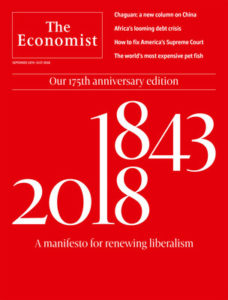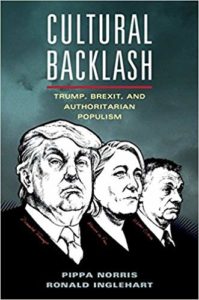
(PRNewsfoto/The Economist)
It is time for a liberal reinvention, according to The Economist, which advocates “a liberal revival—a liberalism for the people,” echoing similar calls for democratic renewal.
In one flavor or another, liberal democracy came to dominate the West and from there it started to spread around the world, it notes:
Yet political philosophies cannot live by their past glories: they must also promise a better future. And here liberal democracy faces a looming challenge. Western voters have started to doubt that the system works for them or that it is fair. In polling last year just 36% of Germans, 24% of Canadians and 9% of the French thought that the next generation would be better off than their parents. Only a third of Americans under 35 say that it is vital they live in a democracy; the share who would welcome military government grew from 7% in 1995 to 18% last year. Globally, according to Freedom House, an NGO, civil liberties and political rights have declined for the past 12 years—in 2017, 71 countries lost ground while only 35 made gains.
 Democracy is a most unnatural act. People have no innate democratic instinct; we are not born yearning to set aside our own desires in favor of the majority’s. Democracy is, instead, an acquired habit, The Atlantic’s Yoni Appelbaum writes:
Democracy is a most unnatural act. People have no innate democratic instinct; we are not born yearning to set aside our own desires in favor of the majority’s. Democracy is, instead, an acquired habit, The Atlantic’s Yoni Appelbaum writes:
Like most habits, democratic behavior develops slowly over time, through constant repetition. For two centuries, the United States was distinguished by its mania for democracy: From early childhood, Americans learned to be citizens by creating, joining, and participating in democratic organizations. But in recent decades, Americans have fallen out of practice, or even failed to acquire the habit of democracy in the first place.,
The results have been catastrophic. As the procedures that once conferred legitimacy on organizations have grown alien to many Americans, contempt for democratic institutions has risen.
 “The American system of government functions properly only when embedded in a culture deeply committed to democracy; that culture sustains the Constitution, not the other way around,” he adds.
“The American system of government functions properly only when embedded in a culture deeply committed to democracy; that culture sustains the Constitution, not the other way around,” he adds.
“Europe and America are in the throes of a popular rebellion against liberal elites, who are seen as self-serving and unable—or unwilling—to solve the problems of ordinary people,” The Economist says. “Elsewhere a 25-year shift towards democracy and open markets has gone into reverse, even as China, soon to be the world’s largest economy, shows that dictatorships can thrive.”
“And we urge the West to shore up the liberal world order through enhanced military power and reinvigorated alliances.”







